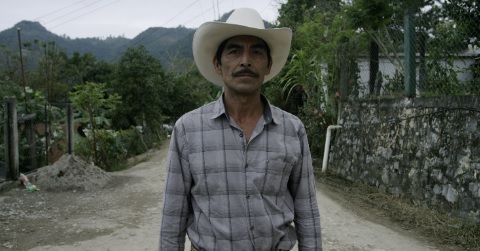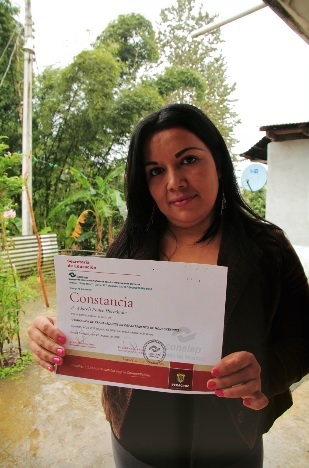
Support justice-driven, accurate and transparent news — make a quick donation to Truthout today!
Ten hours by bus coming from Mexico City, I finally arrived in the tiny remote municipality, surrounded by mountains and a dense fog, in the state of Hidalgo, Mexico. The town boasts about 21,000 people, many of whom are self-sustained farmers.
Each year, over 120,000 people come from places such as this in Hidalgo to work under an H2-A VISA in agriculture and in other industries like landscaping, construction – and crab picking under an H2-B VISA.
I have spoken to people here who are happy with their experience going to the US under this program. Sebastian, pictured here, has gone to the US for 23 seasons to work in agriculture. The money he made has helped him take care of his family and the food he picked helps to feed American families.
 (Photo by Alex Z. Reynaud)For many like him, the program offers a seemingly safer alternative to crossing the border without papers. It’s also only temporary, which means people can come home to their families and friends. Without the opportunity to work abroad, many people have little to no other options to make an income, especially in such remote areas.
(Photo by Alex Z. Reynaud)For many like him, the program offers a seemingly safer alternative to crossing the border without papers. It’s also only temporary, which means people can come home to their families and friends. Without the opportunity to work abroad, many people have little to no other options to make an income, especially in such remote areas.
Yet the high demand for VISAs also has created an illegal economy in both Mexico and in the US: the business of charging people excessively high fees to get these VISAs. Fake labor recruiters have been known to take advantage of people by making them pay for VISAs that don’t exist. When the job is in fact real, it is normal that recruiters charge to place people from Mexico in US jobs, even though this is illegal under both US and Mexican law.
 Ada holding her “diploma.” (Photo by Lindsay Van Dyke)One person I spoke with here has had three experiences with labor fraud. One recruiter going so far as to pose as being from the “Secretary of Education” who made her take a fake housekeeping course, in which she was awarded a diploma (also fake) for its completion. When the time came to get her papers and VISA, the recruiters were gone, along with her money she paid for the course.
Ada holding her “diploma.” (Photo by Lindsay Van Dyke)One person I spoke with here has had three experiences with labor fraud. One recruiter going so far as to pose as being from the “Secretary of Education” who made her take a fake housekeeping course, in which she was awarded a diploma (also fake) for its completion. When the time came to get her papers and VISA, the recruiters were gone, along with her money she paid for the course.
Employers in the US, under pressure with competing global prices, see the Guestworker program as a reliable and legal way to bring workers to the US. Reliable, that is, until recently, when the Department of Labor temporarily stopped processing H2-B Visas (it has since resumed) which left many employers and workers stressed and searching for other options.
Especially in industries like agriculture, retaining a stable labor force willing to work for the offered wages has become increasingly difficult, and the H2-A VISAs under the Guestworker program have been a solution for some. While current estimates deem that there are 1.5 million farmworkers in the US, there are only about 65,000 VISAS given out each year to do this type of work.
There has also been documentation of employers who have used the program to undermine residents, as Kansas City Star cited when a VISA company scheduled interviews for jobs on Christmas Eve, and then when people from the US did apply, they made the jobs sound unappealing. Or in Florida when the employers at resorts and country clubs were criticized for using the Guestworker program to import workers for jobs that weren’t made available to locals.
When thinking about the title of “Guest” for my film, which Merriam Webster defines as: “a person who is invited to visit or stay in someone’s home, to a place or an event as a special honor,” I realized it has a very different meaning for people who come to the US as “guests” in the Guestworker program.
As an actual guest in another country, I’ve had freedom, mobility, and have been accepted warmly by most. It has been a cherished experience for me.
That’s why as part of the documentary, I think it could too be powerful for an American family to spend some time in rural communities here that aren’t written about in travel blogs, (i.e. Cancun) to learn what people here are actually like and to film their experience for others to learn from.
GUEST Trailer from lindsay van dyke on Vimeo.
While in this process of working on “Guest,” we have been speaking with Mexican migrants, and soon with US employers, workers, and experts, about their knowledge and personal experiences to learn: Is there a way we can have a functioning legalimmigration system that doesn’t abuse workers, that fits employers’ needs, and doesn’t undermine the needs of Americans who have low educational obtainment and are unemployed?
I know I for one am not sure yet. Join me on the journey of creating Guest to find out.
Media that fights fascism
Truthout is funded almost entirely by readers — that’s why we can speak truth to power and cut against the mainstream narrative. But independent journalists at Truthout face mounting political repression under Trump.
We rely on your support to survive McCarthyist censorship. Please make a tax-deductible one-time or monthly donation.